

In the upcoming years, Ireland remains a magnet for international students due to its excellent education and rich cultural encounters. This piece delves into the quality of life awaiting international students in Ireland, offering insights across diverse daily life facets.
From housing to costs, this all-encompassing guide aims to provide a vivid understanding of the international student experience in Ireland.
In this blog we will cover the following 17 topics:
Ireland, renowned for its quality education and vibrant academic environment, offers diverse educational opportunities. Unlike some other countries, Ireland does not provide free education to residents, but its tuition fees are competitive.
For undergraduate programs, the average annual tuition for domestic students is around €3,000 to €5,000, while international students might pay between €9,000 and €20,000, depending on the institution and course.
Tuition fees for popular undergraduate programs are as follows:
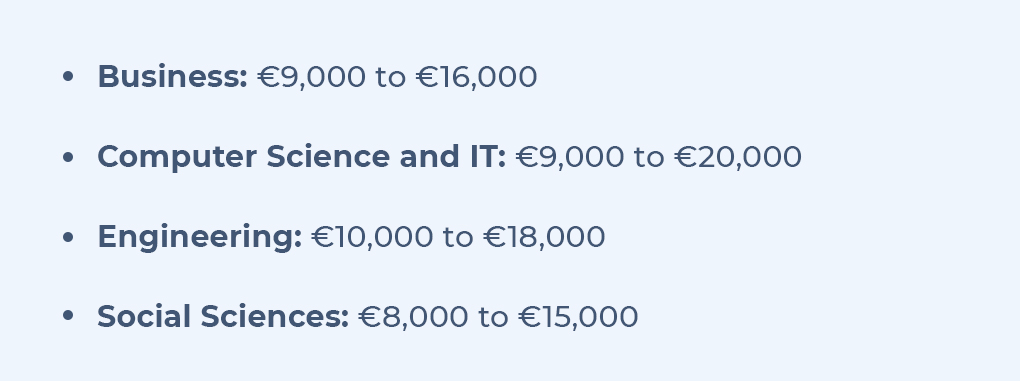
Postgraduate program fees can range from:
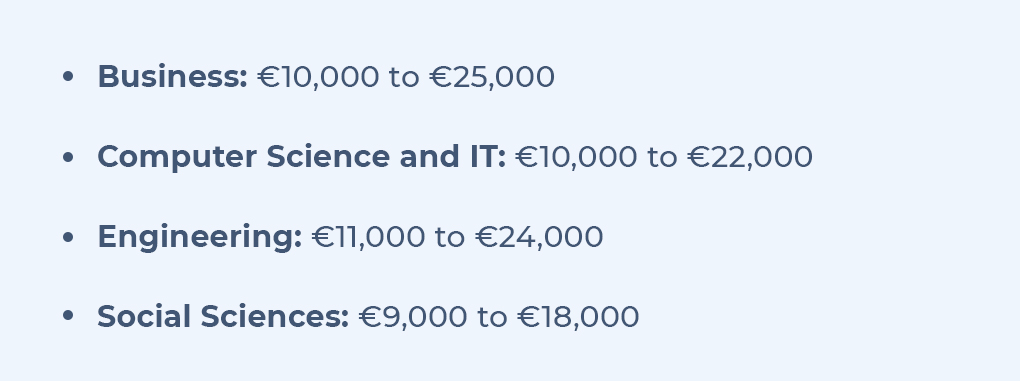
These figures provide an overview of tuition costs for prospective students considering studying in Ireland. Notably affordable institutions include:
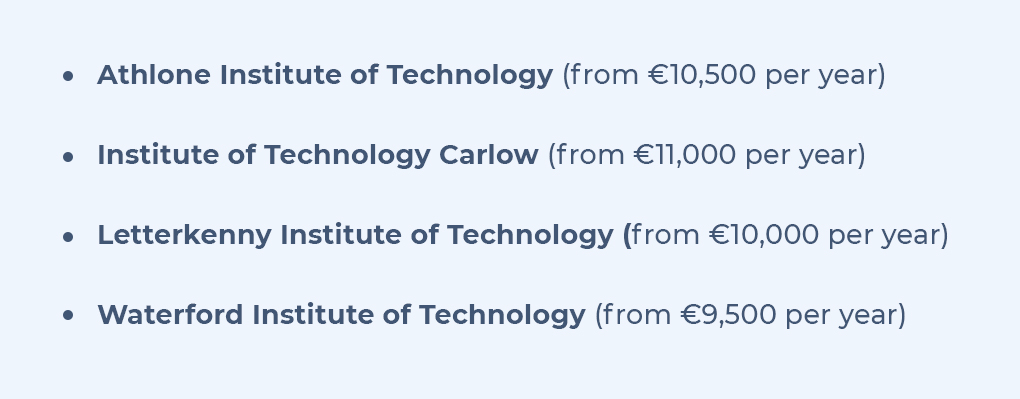
There are various accommodation options available for international students in Ireland, each with its associated costs and benefits.
On-campus accommodation, also referred to as university dormitories or halls of residence, is a popular choice among international students. These accommodations are conveniently located within or near the university campus, providing easy access to classes and campus facilities.
Cost: The cost of on-campus accommodation varies depending on factors such as location, room size, and included amenities. On average, you might expect to pay around €150 to €300 per week. En-suite rooms or apartments with more amenities tend to be on the higher end of the price range.
Advantages:
Private halls of residence, managed by private companies, offer a range of room types and communal facilities, like on-campus accommodations.
Cost: Private halls of residence are competitively priced, ranging from approximately €180 to €350 per week. Costs vary based on location, room type, and included amenities.
Advantages:
Private accommodation involves renting apartments, flats, or houses from private landlords. This option offers more independence and the chance to live off-campus.
Cost: The cost of private accommodation varies widely based on location and property type. In cities like Dublin, you might expect to pay around €800 to €1,500 per month for a one-bedroom apartment. Costs are generally lower in smaller cities.
Advantages:
Homestays involve living with a local host family, providing a unique cultural experience and a chance to immerse in Irish daily life.
Cost: Homestay costs vary based on location, meals, and comfort level. On average, you might expect to pay around €150 to €250 per week.
Advantages:
Short-term accommodations like hostels, guesthouses, or serviced apartments are ideal for students arriving in Ireland and needing temporary housing until finding a permanent solution.
Cost: Short-term accommodation costs vary based on location and comfort level. Hostels are the most budget-friendly option.
Advantages:
When considering the cost of living in Ireland, factoring in expenses for food and groceries is crucial for international students. Ireland boasts a rich culinary scene, ranging from home-cooked meals to dining at local establishments. Let's delve into the specifics of food costs and effective budget management.
Preparing your own meals at home proves to be a cost-efficient choice, granting control over expenses and dietary preferences. Here's an overview of what you can anticipate:
Though cooking at home is economical, occasional dining out can be a delightful experience. Here's what you can expect when dining out:
Cafes and Fast Food: Budget-friendly options like cafes and fast-food outlets provide quick meals. A meal at a fast-food eatery could cost approximately €6 to €12.
Restaurants: Enjoying mid-range restaurants or local eateries may incur higher costs, with meals averaging €20 to €40 per person, excluding beverages.
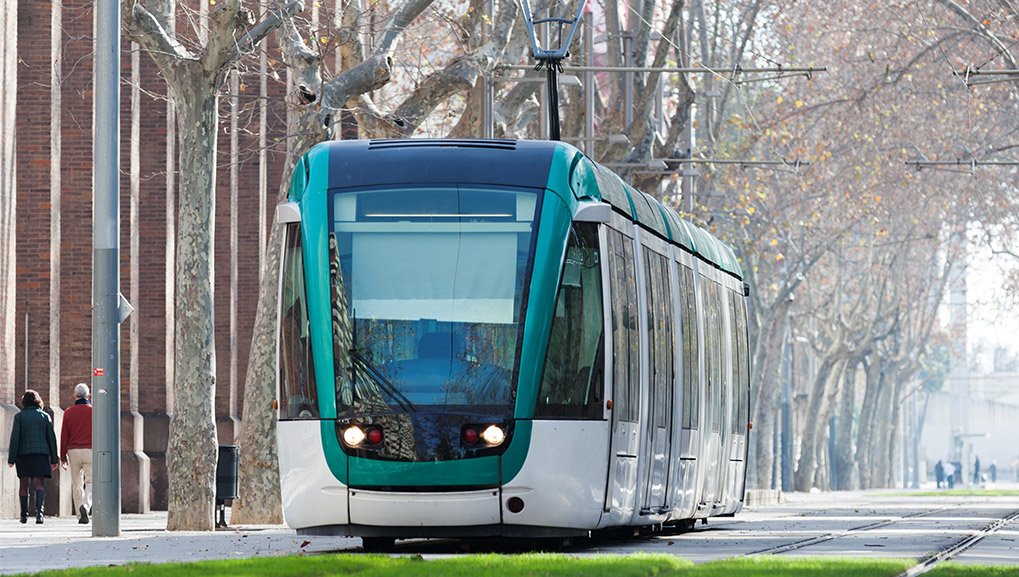
Navigating around Ireland is a key consideration for international students. The country offers a comprehensive transportation network that encompasses public transit options and alternative modes of travel. Understanding transportation expenses and making informed choices can aid in efficient budget management.
Ireland features a well-integrated public transportation system encompassing buses, trains, trams, and local services. Here's what you should know:
Leap Card (Dublin): In Dublin, the Leap Card serves as a versatile tool for accessing public transport, including buses, trams, and DART trains. It offers reduced fares compared to individual tickets.
A Leap Card can cost around €1.55 for a single bus journey and approximately €2.25 for a short tram ride within Dublin.
Travelcards: Some cities, including Dublin, provide daily, weekly, or monthly Travelcards, granting unlimited travel within specified zones. These prove cost-effective for frequent transportation users.
Beyond Dublin: Other cities also offer extensive bus and train services, often with student discounts on transportation passes.
Cost: Public transportation expenses differ based on location and frequency of use. On average, monthly passes provide better value. Outside Dublin, bus and tram fares vary, but a single journey might generally range from €1.50 to €3.
Cycling is a popular and eco-friendly mode of transit in Ireland. Numerous cities offer bike lanes and bike-sharing schemes.
Cost: Cycling is economical if you own a bicycle. Alternatively, purchasing a second-hand bike or utilizing a bike-sharing service might cost approximately €1 to €2 for short rides.
Taxis and ride-sharing platforms like Uber operate in urban centers. While convenient, they are generally pricier than public transportation.
Cost: Taxi and ride-sharing expenses hinge on travel distance. It's advisable to use them sparingly, especially for special occasions or when time is of the essence.

Balancing academic commitments with leisure activities is essential while studying in Ireland. The country presents a diverse range of cultural experiences and entertainment opportunities for international students.
Here's a comprehensive guide to managing leisure expenses and maximizing your free time.
Ireland boasts rich history and culture, offering numerous museums, galleries, and historical sites to explore. Many of these attractions provide discounted or free entry for students.
Cost: Entry fees vary based on the attraction. Some museums and galleries offer free entry, while others might charge approximately €5 to €15 for students.
Cities like Dublin and Cork host vibrant performing arts scenes, featuring plays, musicals, ballets, and more. You can enjoy world-class theatre productions and diverse performances.
Cost: Ticket prices fluctuate depending on the show and seating. Student discounts might be available for theatre tickets.
Ireland's cities offer a dynamic music and nightlife scene with live music venues and nightclubs. Concerts, gigs, and DJ nights are common.
Cost: Concert ticket prices vary, influenced by the artist and venue. Some clubs may have entry fees, particularly on weekends.
Ireland's scenic beauty is highlighted by its parks and green spaces. These areas are perfect for leisurely walks, picnics, and outdoor activities.
Cost: Many parks have free admission. Some outdoor activities could involve rental costs for sports equipment.
Irish universities host various student clubs and societies catering to diverse interests, from sports and hobbies to culture and academia.
Cost: Membership fees for student clubs and societies are generally affordable and grant access to social events and activities.
Mobile Connectivity in Ireland:
Ireland's mobile market is served by operators like Vodafone, Three, Eir, and Virgin Mobile. Virtual operators like Tesco Mobile also operate using the infrastructure of primary providers.
Coverage: Ireland has comprehensive mobile coverage, with urban areas enjoying 4G and, increasingly, 5G services. Rural regions maintain reasonable 3G or 4G coverage.
Cost: Basic pay-as-you-go (PAYG) plans with minutes, texts, and data allowances can start around €10. Contract plans, often including a smartphone, range from €20 to €50 or more based on package features.
Internet Connectivity in Ireland:
Ireland's broadband landscape is diverse, with providers like Eir, Virgin Media, and Sky offering various plans.
Types of Broadband: ADSL and fibre optic broadband options are available. Fibre optic offers high speeds and is widespread in urban areas.
Cost: Standard broadband costs about €30 to €50 per month. Fibre optic packages range from €40 to €60 per month, offering speeds up to 1 Gbps.
Installation: New connections might incur installation fees, waived during promotions or with longer contracts.
These insights help you manage your leisure expenses and stay connected while enjoying your time in Ireland.

Juggling your studies with part-time work can be a beneficial way to manage expenses and gain valuable work experience during your time in Ireland. Here's a comprehensive guide to understanding the part-time work options available for international students.
Many Irish universities offer on-campus job opportunities tailored to international students. These roles are designed to be flexible and accommodating to your academic timetable.
Types of On-Campus Jobs:
Work Hours: On-campus positions typically allow up to 20 hours of work per week during term time and full-time hours during breaks.
Advantages:
International students holding a valid student visa can also work off-campus in Ireland. Off-campus jobs provide broader work exposure and insight into the local job market.
Types of Off-Campus Jobs:
Internships
Work Hours: Similar to on-campus roles, off-campus employment usually permits up to 20 hours of work per week during term time and full-time hours during breaks.
Advantages:
When exploring part-time work, consider these regulations:
Work Hours: You can work up to 20 hours per week during term time and full-time during holidays while studying.
Minimum Wage: Ireland has a minimum wage requirement that employers must adhere to. Research the current minimum wage rates.
Personal Public Service Number (PPSN): To work legally in Ireland, you'll need a PPSN. You can apply for one upon arrival.
Balancing Work and Studies
Striking a balance between work and academics is crucial:
Time Management: Organize your work schedule around classes and study sessions for a harmonious balance.
Prioritize Studies: Remember that your primary focus in Ireland is education. Ensure work commitments enhance, not hinder, your academic performance.
Effective Communication: If managing both becomes challenging, communicate with your employer to discuss potential adjustments to your work schedule.
Maintaining this equilibrium ensures you make the most of your work and academic experiences in Ireland.
The "Post-Graduate Work Visa" allows international students to extend their stay for up to 2 years after completing their undergraduate studies and up to 3 years for postgraduate degrees.
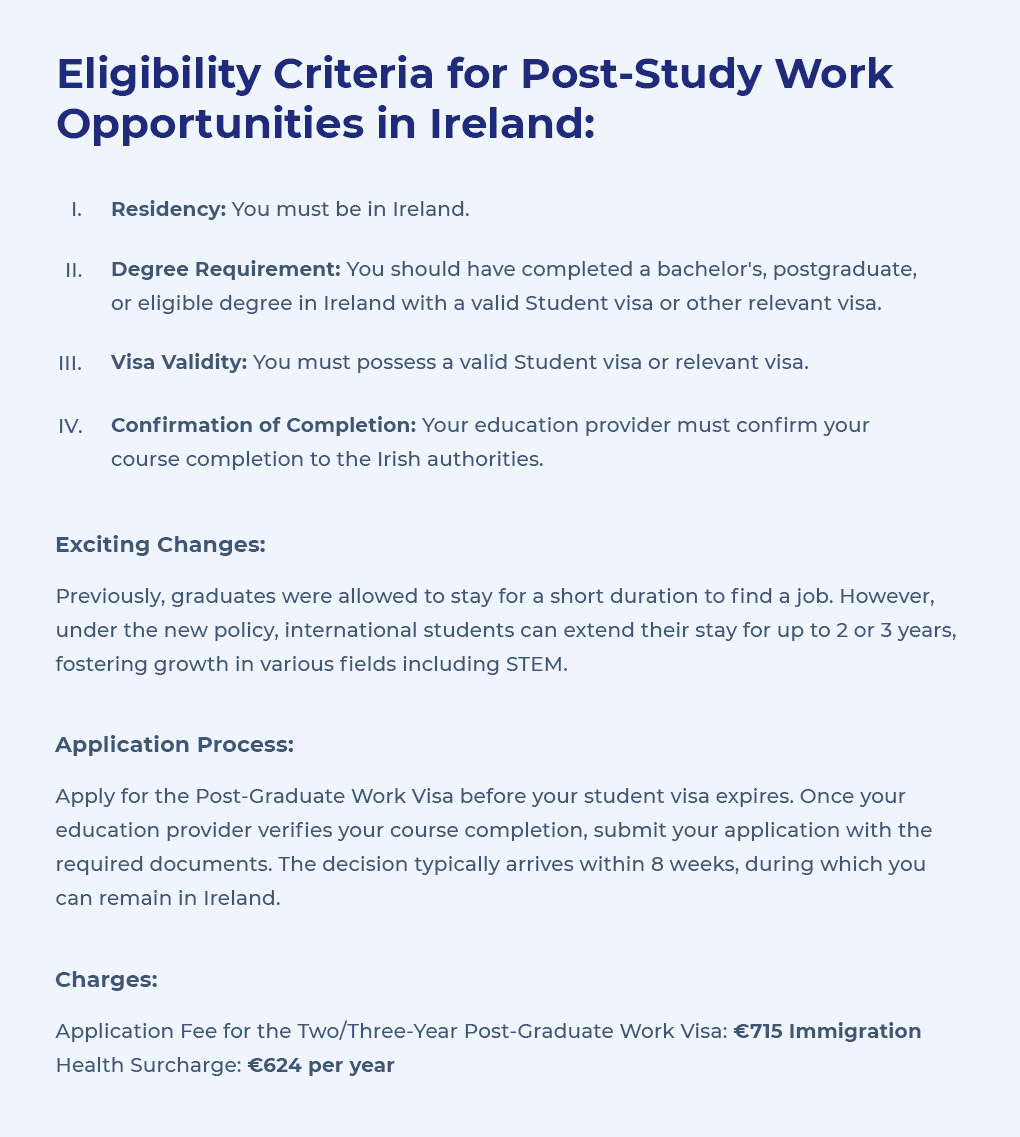
Advantages:
A crucial financial consideration for international students is the exchange rate, particularly when converting to Euros. Estimating daily expenses involves understanding the value of your home currency in EUR. Several exchange services and banks might adjust the rate to maximize profits from currency conversion.
As such, it's essential for prospective students to explore both affordable and pricier cities in Ireland, gaining a clear understanding of potential living costs during their academic journey in the country.
Here are the five most affordable cities in Ireland to live in:
And if you're seeking more budget-friendly options due to the cost-of-living concerns, here are the five cheapest cities:
Understanding the cost dynamics of different Irish cities will help you plan your finances effectively during your study abroad experience.

The latest available data, as of August 2023, indicates that the average weekly wage in Ireland, excluding bonuses, stands at approximately €750 before taxes. This translates to an estimated annual salary of around €39,000, reflecting an increase of 8.2% during the period from April to June 2023. This growth in wages represents a significant upturn, marking one of the most substantial increases in recent years.
However, this data provides a general overview of earnings, with variations influenced by factors such as age, geographical location, employment sector (public or private), industry specialization, and position within a company.
Interestingly, the median compensation for top CEOs in Ireland witnessed a notable rise as well. According to analysis from the Irish Times, the median pay for CEOs in the Irish Stock Exchange increased to €1.8 million in 2022, showcasing an upward trend. This figure, though, is significantly higher than the average earnings of the broader workforce.
For a more detailed breakdown of typical earnings across various sectors and demographics, the Central Statistics Office (CSO) provides insights. The most recent CSO data from their Earnings and Labour Costs Survey, published in March 2023, offers a deeper understanding of salary distributions throughout the country.

Ensuring access to quality health care is a crucial aspect for international students studying in Ireland. The country provides a comprehensive health care system, and understanding health care options and insurance requirements is essential to maintain your well-being and financial security during your study period.
Ireland operates a publicly funded health care system known as the Health Service Executive (HSE). The HSE offers medical services, consultations, treatments, and health care facilities to residents, including international students.
Access to HSE: International students studying in Ireland are eligible to access HSE services. However, it's recommended to have private health insurance to cover certain costs not included in the public health care system.
Advantages:
While the HSE provides essential health care services, some international students opt for private health insurance to extend their coverage.
Advantages:
Prescription medication costs can apply even within the HSE system. You might need to pay a fee for each prescribed medicine, unless you qualify for exemption (e.g., with a medical card).
Cost: As of 2023, the cost of a prescription item is approximately €2.00.
It's advisable to register with a local General Practitioner (GP) to ensure access to primary health care services. GPs handle non-emergency health concerns and serve as your initial point of contact for medical matters.
Advantages:
In emergency situations, you can seek medical treatment at Accident & Emergency (A&E) departments in hospitals. Emergency care is provided regardless of whether you have private health insurance, ensuring prompt assistance during critical times.

Studying in Ireland offers not only a high-quality education but also a vibrant cultural and social scene. Engaging in cultural activities, participating in social events, and immersing yourself in the local community can enhance your overall student experience. Here's a comprehensive guide to managing your cultural and social expenses while enjoying your time in Ireland.
Ireland embraces cultural diversity and community involvement, providing ample opportunities for personal growth and expanding your horizons through interactions with people from various backgrounds.
Cost: Engaging in cultural exchange and participating in community events is often free or involves minimal charges for attending activities or gatherings.
Irish universities offer a wide array of student societies and clubs covering diverse interests. Joining these groups allows you to connect with fellow students who share your passions, making your student life more enriching.
Cost: Membership fees for student clubs and societies are generally affordable. These fees contribute to organizing events, workshops, and social activities.
Ireland hosts a plethora of local celebrations, festivals, and events throughout the year, providing insights into Irish traditions and customs. Participating in these festivities offers an authentic cultural experience.
Cost: Many local celebrations and festivals offer free entry or involve a nominal fee. Some larger events or international festivals might have higher admission costs.
Ireland boasts captivating museums and cultural institutions that showcase its history, art, and heritage. Several establishments provide discounted or complimentary entry for students.
Cost: Museum and cultural institution entry fees can vary. Some venues offer free admission, while others may charge around €5 to €10 for student entry.
Socializing with friends often involves dining out at restaurants or meeting at cafes. Exploring Irish cuisine and trying various eateries is a delightful way to engage in local culture.
Cost: The cost of socializing and dining out varies based on the venue and preferences. Budget around €15 to €30 for a casual meal or social outing.
By actively participating in cultural and social activities in Ireland, you can enrich your experience and create lasting memories during your time as an international student.

As an international student pursuing education in Ireland, you'll be immersed in a dynamic academic environment that fosters intellectual growth, independent thinking, and research excellence.
This section offers a comprehensive exploration of the teaching methods and research opportunities that contribute to the enriching academic experience provided by Irish universities.
Irish universities are celebrated for their commitment to cultivating independent learning and critical thinking skills among students. The teaching approaches employed in these institutions mirror this dedication to nurturing well-rounded and intellectually curious individuals.
Lectures constitute a fundamental component of Ireland's higher education system. During these sessions, professors present key concepts, theories, and ideas pertinent to the course material. However, the emphasis extends beyond passive note-taking, encouraging students to actively engage with the material, pose inquiries, and seek clarification.
Seminars are smaller group sessions designed for in-depth discussions and analysis. Students are expected to actively participate, share their viewpoints, and engage in constructive debates. Seminars facilitate intimate exploration of intricate subjects, fostering a culture of critical thinking.
Tutorials offer personalized learning experiences. These sessions involve close collaboration between students and professors or tutors to delve into specific subjects, clarify uncertainties, and receive constructive feedback on assignments. Tutorials provide opportunities for one-on-one or small-group interactions, allowing students to delve deeper into subjects.
Irish universities are globally recognized for their contributions to groundbreaking research across diverse fields. International students are presented with unique opportunities to engage in cutting-edge research projects, contributing to both their academic journey and professional development.
Many Irish universities prioritize research collaborations between students and faculty members. This enables international students to actively participate in ongoing research initiatives, collaborate with field experts, and contribute to the advancement of knowledge.
Even at the undergraduate level, Irish universities encourage students to participate in research undertakings. This early involvement empowers students to explore their interests, develop vital research skills, and gain insights into the methodologies employed in their chosen disciplines.
Well-equipped research facilities and extensive resources available at Irish universities provide an enabling environment for students to explore a wide array of research areas. Access to state-of-the-art laboratories, libraries, and online databases empowers students to conduct comprehensive research.
Engaging in research activities not only enriches academic experiences but also enhances employability. Involvement in research projects equips international students with analytical thinking, problem-solving abilities, and a profound comprehension of their chosen fields – attributes highly valued by prospective employers.
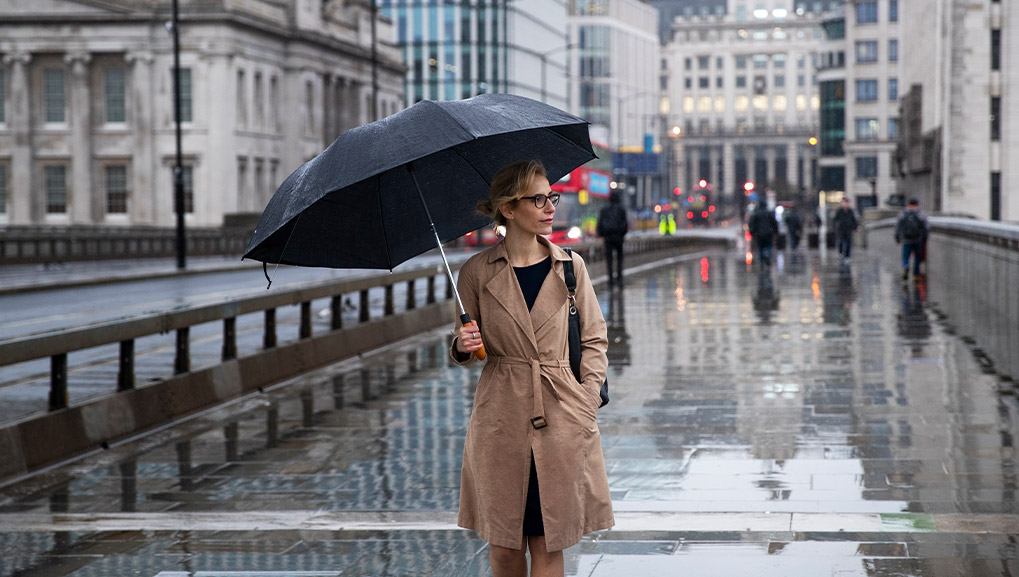
Ireland's weather is characterized by its variability, much like that of the UK. It's advisable to be prepared for rain and to have suitable clothing to remain comfortable throughout the year.
The shorter days in autumn and winter can trigger feelings of depression in some individuals, a phenomenon known as Seasonal Affective Disorder (SAD). Students should be aware of this and consider options such as using SAD lamps, taking Vitamin D supplements, or seeking support if needed.
Comprehending visa requirements and regulations is of utmost importance for international students planning to study in Ireland. The Irish government offers comprehensive information on student visas, work permits, and post-study opportunities.
For more detailed insights, you can explore our blog titled "Unlocking Your Path to Ireland: Essential Student Visa Guidelines."
Ireland is generally considered a safe country for residents and visitors alike. However, it's essential to remain vigilant and follow basic safety guidelines to ensure your well-being.
To gain a deeper understanding, you can read our blog post titled "Safety and Security for International Students in Ireland"

Managing your finances effectively while studying in Ireland is essential, and having a local bank account can greatly simplify this process. Opening an Irish bank account offers convenient access to your funds and assists in organizing your financial matters, including paying for tuition, accommodation, and daily expenses.
Embarking on the journey of an international student in Ireland provides a harmonious mix of academic enrichment, cultural diversity, and individual development. With strong support structures, ample employment prospects, and a thriving social milieu, Ireland remains a premier destination for those aiming for a superior quality of life while advancing their education. Embrace this transformative experience, extract the utmost from your encounters, and allow Ireland to imprint an enduring influence on both your academic pursuits and personal voyage.
In addition to traditional banks, Ireland offers digital banking options like N26 and Revolut. These online-based banks provide real-time transaction updates, fee-free international payments, and budgeting tools that can be advantageous for students.
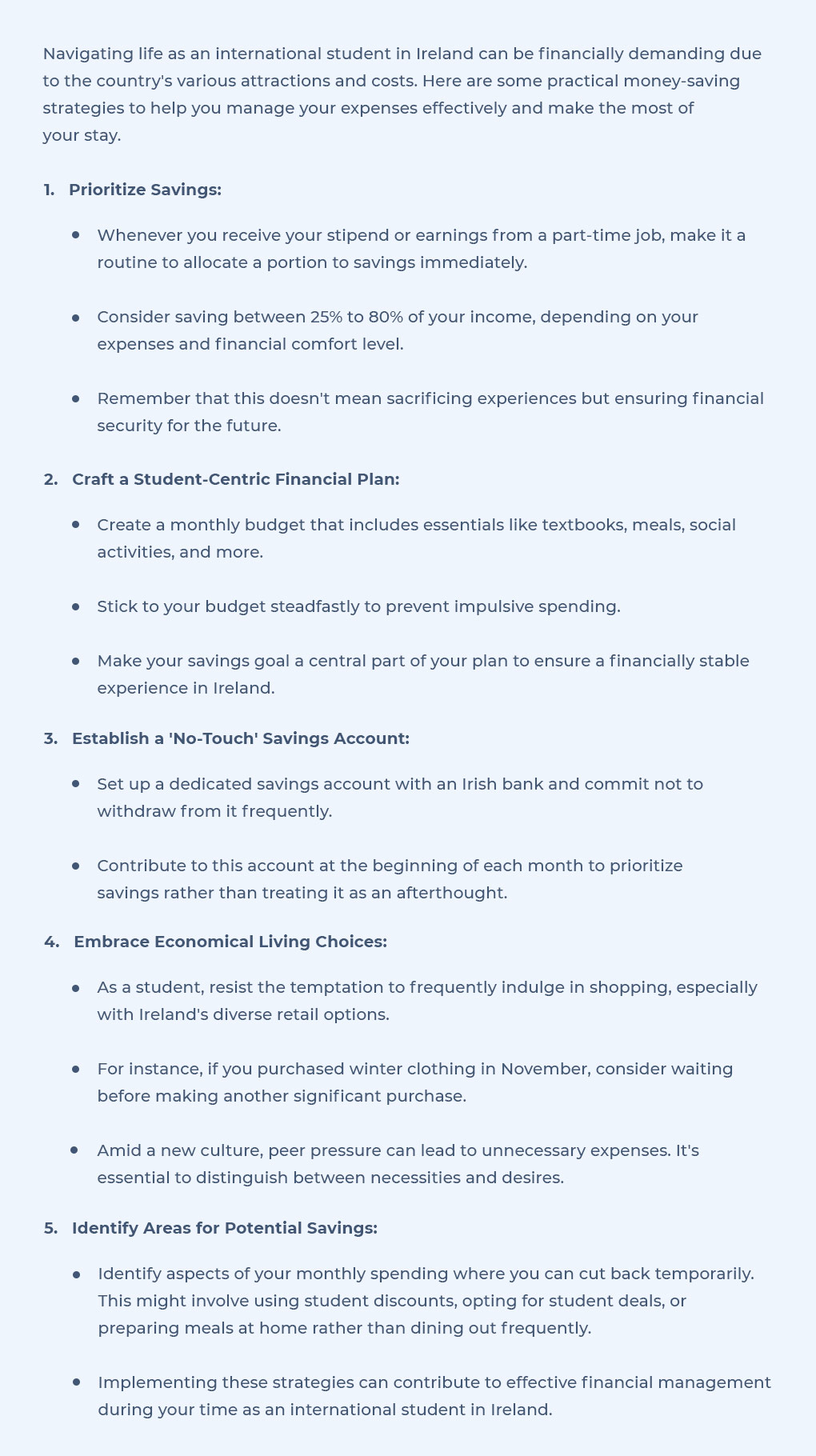
Embarking on the journey of an international student in Ireland provides a harmonious mix of academic enrichment, cultural diversity, and individual development. With strong support structures, ample employment prospects, and a thriving social milieu, Ireland remains a premier destination for those aiming for a superior quality of life while advancing their education. Embrace this transformative experience, extract the utmost from your encounters, and allow Ireland to imprint an enduring influence on both your academic pursuits and personal voyage.

Studying abroad is an exciting and life-changing experience that offers students a chance to gain a global perspective and valuable exposure ...

In our rapidly globalizing world, where boundaries are melting away and opportunities abound, proficiency in the English language has become ...

Choosing to pursue higher education abroad is an exciting and life-changing decision. Among the plethora of options available to internationa...

Studying abroad is a life-altering adventure that opens doors to new cultures, experiences, and opportunities. Among the plethora of global s...

Australia, renowned for its world-class education and diverse cultural experiences, continues to be a favoured destination for international ...

Australia is not just famous for its iconic Sydney Opera House, the Great Barrier Reef, and its unique wildlife; it is also recognized global...

Studying abroad is a life-changing decision, and with so many options available, it can be overwhelming to choose the right country and univers...

As of March 2022, Australia has seen a consistent rise in its international student numbers, with enrolments reaching 440,219. This marks an ...